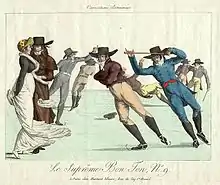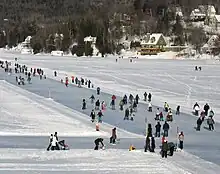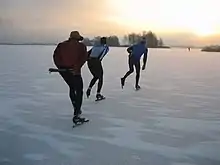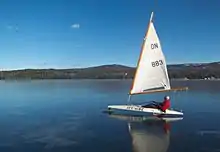Ice skating is a popular winter sport – or many, as you can play ice hockey, ringette and similar games, figure-skate, race or go for a long-distance journey.
Other ways to move on ice include ice sailing with an ice sail or an ice boat or using a kicksled.
Understand


Human beings have gone ice skating in cold climates probably since they first happened upon them. In the appropriate climates numerous items have been found from all eras that can be interpreted as having been used for ice skating. In fact, the German meat dish Eisbein literally means "ice bone" and the bone that meat contains was used for ice skating in times past.
In warmer climates, a tradition for ice skating is absent, because artificial cooling was only developed in the 19th century and it is still a major expenditure to keep vast expanses of water frozen at tropical ambient temperatures. That said, there are now artificial ice rinks in big cities and high income countries even with desert or tropical climates.
Skating proper at the Winter Olympics is divided into three disciplines; figure skating, speed skating and short track speed skating. The latter two disciplines are traditionally dominated by the Netherlands and South Korea respectively. The field in figure skating is more competitive, and while the United States, Canada and Russia are the traditional powerhouses, Asian countries like Japan and South Korea are increasingly challenging their dominance. Also ice hockey is an Olympic sport.
Equipment
There are special skates for the different kinds of skating. You can learn the basics with any skate; often hockey or figure-skating skates are used by beginners. Speed skaters usually use special "clap skates".
Skaters have use of safety equipment, such as helmets. For open-ice skating, ice prods and ice pikes are also essential.
There are skating facilities with equipment for rent, although at most facilities your own equipment is needed.
Do


Ice skating can be combined with hiking or ice fishing, subject to local regulation. Long distance skates, safety equipment and an experienced guide are recommended.
Destinations
Most places with long winters: Canada, the Nordic countries, northern parts of the United States and Russia. In the Netherlands skating is a national sport, even though most of the winter is too warm there – it historically wasn't (especially during the "Little Ice Age" when many Dutch traditions came into being) and the myriad canals make for ample surfaces if cold weather lasts a week or two. It is also a popular sport in South Korea
There are often both ice hockey rinks and ice for free form skating, more suitable for learning the basics. At some facilities there is music and skating is used as a pastime, with most skaters talking with their company while gently skating around, some perhaps doing basic figure skating.
Stay safe
- See also: Ice safety
Beware of unsafe ice. Use the safety equipment. See also Cold weather.
The ice is hard, the skates are sharp and speeds often high. Also e.g. sticks and pucks can cause damage. Respect any local rules (formal or informal), e.g. about separating different kinds of skaters.
Open-ice skating should be done in groups with an experienced leader.
Respect
Stay clear of slower skaters and children.